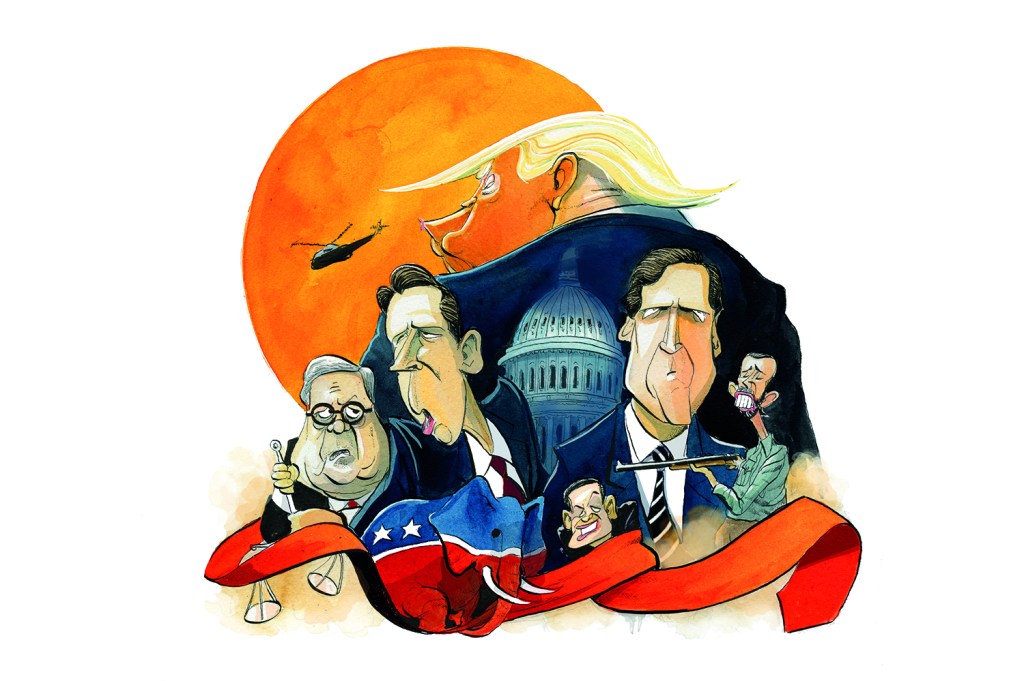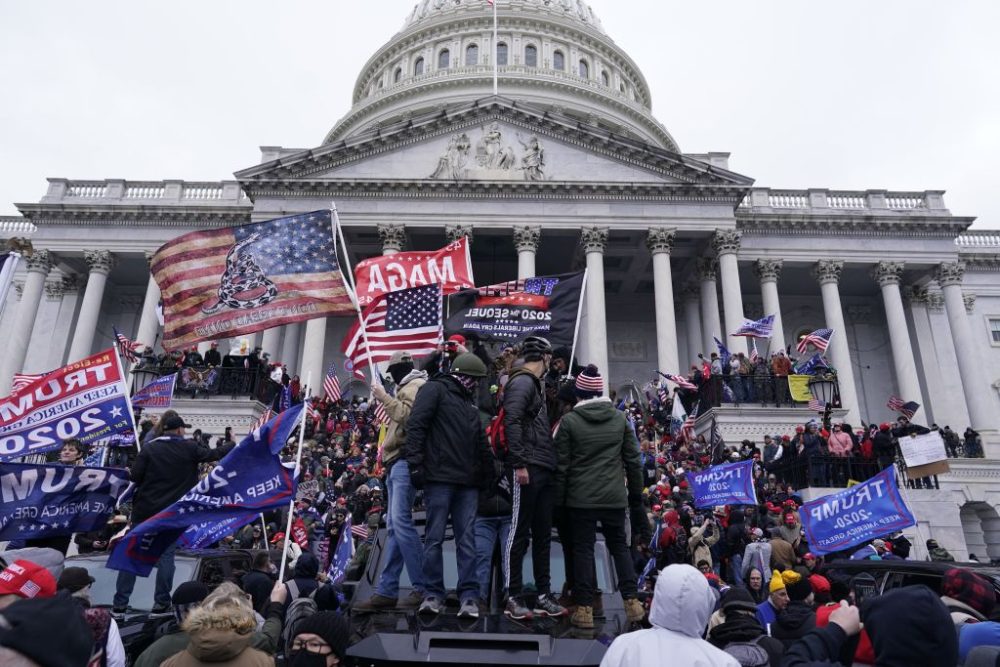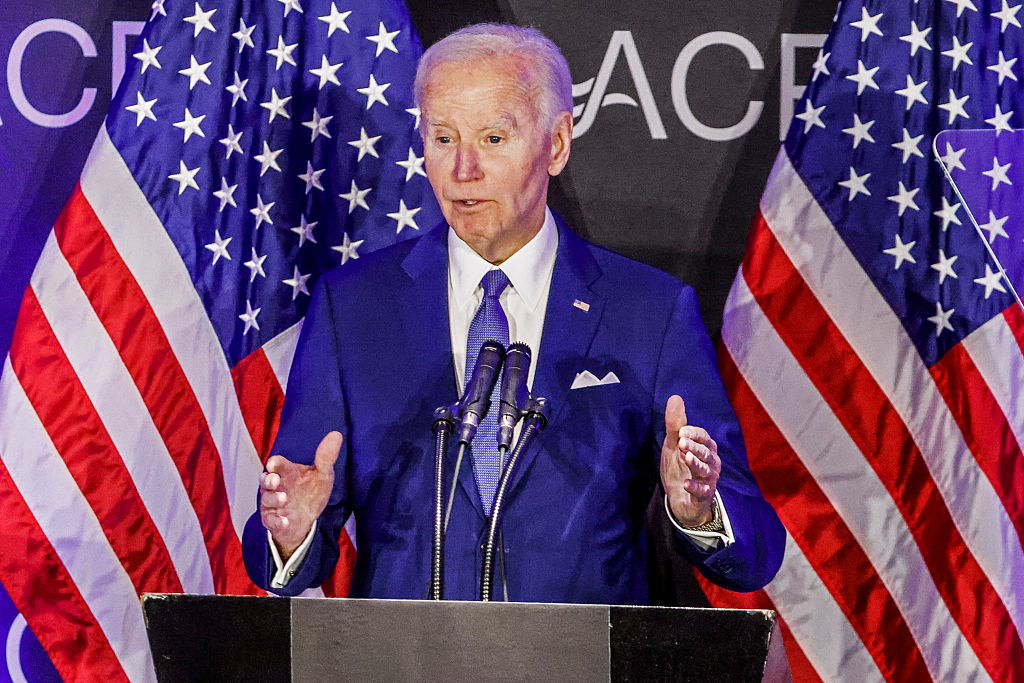Two broad camps divide American conservatism today: those who get it, and those who don’t — the woke and unwoke, if I may borrow a lefty term but give it a slightly different meaning. For the right to have any shot at taming liberalism’s raging furies, woke conservatives must remain ascendant and consolidate the movement.
President Trump was among the first to get it, in his own intuitive, messy way. The ambitious Missouri senator Josh Hawley is likewise woke. So are Attorney General Bill Barr and Fox News host Tucker Carlson. But too many credentialed conservatives don’t get it.
What’s the it conservatives need to get? It is simply this: that the political left neither loves you nor shares many loves with you, certainly not the love of neutral norms and procedures that have long been the stock-in-trade of the center-right establishment.
Partly owing to the shock electoral successes of populism, and partly to liberalism’s own inner logic, the left has now abandoned all the old procedural niceties: in the corridors of power, in the press, in the street, online. To be sure, some ‘moderate’ liberals still mouth the old rhetoric — ‘free speech’, ‘free inquiry’, etc — and get canceled for their trouble. But what their movement as a whole seeks is the brute enactment of substantive liberal commitments.
The left has a crystalline moral vision (moral by its own lights, at any rate). To the liberal mind, norms and procedures are worthwhile only insofar as they help advance this vision. If existing norms and procedures fail to do that, well, new ones will have to be found. The point isn’t to uphold some neutral ground that different groups might contest, with winners and losers periodically switching places. The point is to win. Decisively.
Unwoke conservatives still labor under the quaint impression that a golden age of procedural liberalism can be restored, provided the right is winsome enough. They have no vision of the good society to rival the left’s: how could they, if their foremost obsession is how laws get made, rather than what they contain, or whether they promote the common good? Nor do these conservatives love their natural constituency: the working classes of all races. The effects of this asymmetry have been especially glaring lately. In recent months, the left has used the coronavirus pandemic to enshrine what amounts to a new caste system, tightly regulating who may and who may not legitimately exercise historic American liberties like freedom of speech and assembly. The sheer unfairness of it all, not least the mainstream coverage, is a deep source of conservative heartache.
It isn’t fair that all the major networks and prestige papers framed a massive, tightly packed rally for ‘black trans lives’ in Brooklyn as a courageous act of resistance against injustice, never mentioning social distancing — even as the same outlets poured scorn on small-business owners gathering in Michigan and elsewhere to protest the lockdowns.
It isn’t fair that New York City has cracked down hard against Orthodox Jews holding funerals for their deceased — even as authorities in Gotham instruct their coronavirus ‘contact-tracers’ not to ask New Yorkers about their participation in Black Lives Matter protests.
It isn’t fair that Democrats and their media allies spent nearly four years attempting to undo the outcome of the 2016 election based on spurious allegations of Russian ‘collusion’ — even as the same Democrats and friendly reporters ignored or played down former Secretary of State John Kerry’s very real extracurricular diplomacy with the Iranian regime after he left office (among many other instances of the kind).
It isn’t fair that liberal media breathlessly reported every discredited ‘collusion’ leak from anti-Trump elements of the security apparatus — yet are quick to append the adjective ‘disputed’ to a headline about a recent intelligence report suggesting that the Beijing and Tehran regimes are determined to help elect Joe Biden.
It isn’t fair that local authorities in Washington, DC refused to punish thousands of acts of violence and vandalism, small and large, by hard-left groups over the summer — even as police in the capital arrested a small, peaceful group of pro-life protesters for writing anodyne messages in chalk in front of an abortion clinic. It isn’t fair a patently false charge of anti-Semitism in Bloomberg News nearly destroyed the life and career of a Trump appointee (he had made fun of anti- Semites on Facebook) — even as Democratic- friendly media shield from criticism and lionize the likes of Ilhan Omar and Rashida Tlaib, both of whom are fond of peddling old-school anti-Semitic tropes.
And on and on. ‘It isn’t fair!’ is the constant refrain on the lips of unwoke conservatives. They aren’t wrong, but their whining is downright lame. And once they’re done whining, they invariably follow up with the same old tired appeals: if we could just write a persuasive public letter, signed by 50 prominent men and women of goodwill, making sure to criticize excesses on our own side, the other side will see that we must turn back the clock to better days. Remember 1984? Remember the 1990s? Weren’t those better days? Did I tell you, young staff editor at Jacobin magazine, about the personal friendship between Ronald Reagan and Tip O’Neill?
To this kind of sweet nostalgia about the tone of public discourse, unwoke conservatives typically add arguments that assume the other side’s premises — but then suggest that the right offers the better way to reach the left’s aims. To take but one of numerous examples: when Trump used his executive authority recently to break the Democratic gridlock hindering coronavirus economic relief, the unwoke right was on hand to say: yes, we agree Trump was wrong to do that, which is why we’ve always opposed the use of executive authority on constitutional grounds. Liberals pocket the concession, knowing full well they will use executive power in just the same way the minute they regain the Oval Office.
The contrast with conservatives who get it — the President, Hawley, Barr, Carlson and a rare few others — couldn’t be sharper. These men don’t agree on everything, to be sure. They are woke, but in different ways, emphasizing diverse issues and commitments. What they share, what makes them woke conservatives, is their willingness to deal with the balance of American social forces as it really is, rather than as they might wish it to be.
They recognize, first, that corporate America (especially the largest firms that dominate the internet and culture industries) actively supports the left’s social and cultural agenda on everything from policing and gender ideology to abortion and immigration. Whatever the cause — I suspect it has to do with more than just executives following trends — it’s a reality. Woke conservatives see it clearly, because they aren’t blinded by the pro-business dogmas of the past.
Carlson, for example, has spent night after night slamming the NBA’s kowtows to China’s totalitarian regime, which the league combines with impeccable political correctness back home. The ‘NBA painted “Black Lives Matter” on its courts,’ he noted in July, ‘allowing players to kneel for the national anthem, giving a finger to the country.’ Hawley in the Senate has likewise hounded NBA executives over their hypocrisy. But if Big Tech, Hollywood, NGOs, the media, etc, are all arrayed with the left against conservatives, then it follows — and this is the second plank of the woke right — that conservatives ‘have no alternative but to use the state for the furtherance of their ends’, as the political scientist Gladden Pappin has argued.
For decades, conservatism dedicated itself to protecting private actors from state tyranny, failing to notice that private actors, too, can be tyrants. Woke conservatives understand the aim of our political community is to secure the ‘general welfare’ of the whole, as the preamble to the Constitution puts it. Maximizing the freedom of private economic actors can’t possibly be the One Thing Needful to fulfill this constitutional promise in every instance. Especially not when the unrestrained action of private firms ends up perversely destroying Americans’ liberties, as happens with Big Tech censorship.
Thus, for example, when Twitter began censoring the leader of the Free World, Trump reacted by calling into question a 1996 federal law that shields social media platforms from libel suits. Hawley would go even further in rethinking that law and in calling for state action against these firms (he is, notably, the author of an astute intellectual biography of Teddy Roosevelt: the great trust-buster).
Third, and related: woke conservatives see both political opportunity and justice in protecting the working and middle classes. The opportunity lies in the fact that the left’s moral vision, while no doubt sincerely held, fundamentally serves the interests of the liberal classes: journalists and other ‘creatives’, academe, high-end tech workers, HR professionals, the white upper-middle class.
For all its fire and fury, the current liberal ferment invariably ends in demands for diversity, representation and correct language — requirements that corporate America is happy to accommodate and which suit the American bourgeoisie as a new system of manners. Liberal ‘social justice’ does precious little to address the precarious condition of the working class; if anything, liberals exacerbate it through importing foreign labor, which undercuts unskilled wages.
Trump intuited all this early on and addressed the plight of the working class as an affront to national greatness. That’s how he managed to make an end run around a GOP establishment committed to all the same things. But a new generation of woke conservatives led by Hawley and Sen. Marco Rubio is increasingly making these arguments in the language of social justice, with the latter explicitly drawing on the social teachings of Pope Leo XIII: the economy and the market exist to serve human beings, not the other way around.
Before the right can even begin to pursue a new agenda of this kind, it needs to protect the will of its voters against liberals’ sneaky efforts to undo ballot-box outcomes — and this is the fourth and final plank of woke conservatism. As Trump learned painfully over the past three and a half years with the Russia and Ukraine probes, there are no neutral institutions, not even the military and state security apparatus. And if conservatism is to lean much more heavily on the state, then the right must ensure that the state bureaucracy doesn’t secretly undermine it at every turn.
That’s where the Bill Barr wing of woke conservatism comes in. Time and again, the Attorney General, looking appropriately enough like a mix of a walrus and The Thing from Fantastic Four, has revealed the partisan liberal activists hiding behind the mask of stolid, gray-haired ‘national-security professionals’. His vow, still not completely fulfilled, to get to the bottom of the various ‘collusion’ hoaxes has made him an object of fear in Washington, and that’s as it should be. We need more Barrs.
Unwoke conservatives shrink from this hard work. Very well. They can either give way to the ascendancy of their woke brethren — or learn to enjoy themselves in the wilderness for a generation or longer.
Sohrab Ahmari is the op-ed editor of the New York Post and the author of the forthcoming The Unbroken Thread: Discovering the Wisdom of Tradition in an Age of Chaos. This article is in The Spectator’s September 2020 US edition.

























